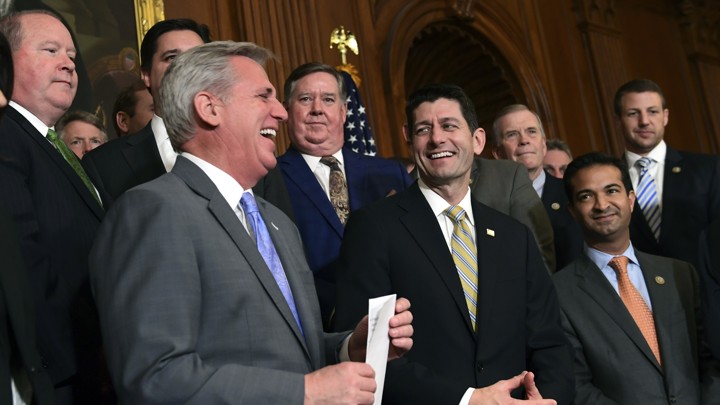There's No Real Defense for How Little the Rich Pay in Taxes and They Know It Starting With Wealthy Republicans
 |
| The Atlantic photo (Members of congress celebrate the tax deduction for the rich bill) |
By Luke Darby
Wealthy Republicans Are Acting Like They Have No Idea How Taxes Work
Over the weekend, Alexandria Ocasio-Cortez made headlines for a minutes-long exchange in a 60 Minutes interview. In it, she proposed that the Green New Deal, a last-ditch effort to fight climate change before the worst effects of it become irreversible, could be funded at least in part by raising the highest tax bracket up to 70 percent.
Now, what this means is that every dollar a person takes in over $10 million would be taxed at a rate of 70 percent. This would obviously affect only the wealthiest Americans, about 0.05 percent of U.S. households, and would raise a projected $720 billion over 10 years. It's also not new, rather it would be a return to what the tax rates were for decades. But according to many high-profile Republicans, it's outright theft.
First there's Dan Crenshaw, who at least admits that he knows what tax brackets are, even if he misrepresents them in his first tweet. But he's a newly-sworn in freshmen in the House. Much more prominent GOP figures than Crenshaw are pretending they don't understand the U.S. tax code at all, including one of highest ranking Republicans in Congress: Steve Scalise, the Louisiana representative who's served in the House for a decade and now is the House Minority Whip. He claimed that the increase would take 70 percent of all income from all Americans.
Ironically, Scalise would only be right if the U.S. were on a flat tax system (where everyone pays the same rate regardless of how much or how little money they have), which Republicans have been pushing for. And Grover Norquist, one of the people most responsible for the GOP's lurch to anti-tax hysteria and who has advocated for a flat tax for years, also weighed in, describing slavery as "when your owner takes 100% of your production."
Norquist is actually describing bosses, not slave owners, but that's not even the grossest thing you have to ignore to make the case that the richest Americans are 30-some-odd percent slaves right now because of their tax bracket. (It should also make any news network seriously reconsider giving Norquist air time as a "tax expert" ever again.)
But raising taxes for the rich has the support of many economists, including Nobel laureates, and many of those think 70 percent is too low. And despite Republican claims, the U.S. wouldn't be the only country with such high rates. At the People's Policy Project, Matt Bruenig writes:
Sweden still manages to have dozens of billionaires.
In 2014, the top one percent of tax payers paid nearly 40 percent of income taxes, more than $540 billion, which certainly seems like a lot. But they also take in the lion's share of wealth and income, more than 25 times as much as the other 99 percent, and income inequality is only growing.
Of course, millionaires and billionaires are far and away the Republican Party's top concern. The Koch brothers alone are likely to be $1 billion richer after the most recent Republican tax cuts, while Paul Ryan celebrated a secretary taking home an extra $1.50 per week.
It's no surprise that when Republicans actually have to go on the defensive, when they have to explain why it's so abhorrent to raise taxes on the richest of the rich, they have to pretend it's an attack on the working class as well. People in the wealthiest 0.1 percent in the U.S. make an average of $35 million annually and the GOP knows it reeks of bullshit to argue that they should keep even more of that last $25 million. Countless repairs and improvements could be made to schools, hospitals, and infrastructure across the country, all for an amount that would still leave the one percent the richest people in the world.
Comments